Related Research Articles

The Spinners are an American rhythm and blues vocal group that formed in Ferndale, Michigan, United States, in 1954. They enjoyed a string of hit singles and albums during the 1960s and 1970s, particularly with producer Thom Bell. The group continues to tour, with Henry Fambrough as the only original member.

"Someday We'll Be Together" is a song written by Johnny Bristol, Jackey Beavers, and Harvey Fuqua. It was the last of twelve American number-one pop singles for Diana Ross & the Supremes on the Motown label. Although it was released as the final Supremes song featuring Diana Ross, who left the group for a solo career in January 1970, it was recorded as Ross' first solo single and Supremes members Mary Wilson and Cindy Birdsong do not sing on the recording. Both appear on the B-side, "He's My Sunny Boy".
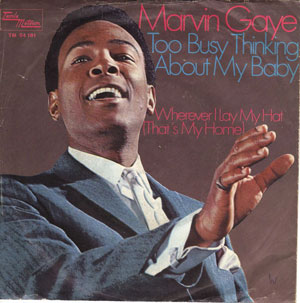
"Too Busy Thinking About My Baby" is a Motown song written by Norman Whitfield, Barrett Strong, and Janie Bradford. The song was first recorded by The Temptations as a track on their 1966 album Gettin' Ready. Eddie Kendricks sings lead on the recording, which was produced by Whitfield. Jimmy Ruffin also recorded a version with The Temptations providing background vocals in 1966. It remained unreleased until 1997.

"I'll Be Around" is a song recorded by the American R&B vocal group The Spinners. The song was co-written by Thom Bell and Phil Hurtt and produced by Bell.

Robert Steel Smith, professionally known as Bobby Smith, also spelled Bobbie, was an American R&B singer notable as the principal lead singer of the classic Motown/Philly group, The Spinners, throughout its history. The group was formed circa 1954 at Ferndale High School in Ferndale, Michigan, just north of the Detroit border. The group had their first record deal when they signed with Tri-Phi Records in early 1961.

"Could It Be I'm Falling in Love" is a 1972 song recorded by the American R&B vocal group The Spinners. The song was co-written by Melvin and Mervin Steals, two songwriter brothers working for Atlantic, who were sometimes credited as "Mystro and Lyric." It was produced by Thom Bell, recorded at Philadelphia's Sigma Sound Studios and the house band MFSB provided the backing. Bobby Smith sings lead through most of the song while Philippé Wynne handles vocal duties on the song's outro.
"It's Growing" is a 1965 hit single by The Temptations for the Gordy (Motown) label. Written by Miracles members Smokey Robinson and Pete Moore and produced by Robinson, the song was a top 20 pop single on the Billboard Hot 100 in the United States, on which it peaked at number 18. On Billboard's R&B singles chart, "It's Growing" peaked at number 3.

"One of a Kind " is a song recorded by the American R&B vocal group The Spinners. It was written by Joseph B. Jefferson and produced by Thom Bell.
"What Love Has Joined Together" is a song written and composed by Miracles members Smokey Robinson and Bobby Rogers, and was recorded by six Motown acts: Mary Wells, The Temptations, Smokey Robinson & The Miracles, Barbara McNair, Syreeta, and Queen Latifah and was issued as B-sides to hits by Wells and The Temptations; "Your Old Standby" for Wells, released in 1963, and "It's Growing" by The Temptations, released in 1965.

"Gonna Give Her All the Love I've Got" is a 1967 Soul song, originally recorded and made a hit by Jimmy Ruffin on Motown's Soul Label imprint. Ruffin's 1967 original version, from his album Jimmy Ruffin Sings Top Ten, reached the Pop Top 30, peaking at #29, and was a Top 20 R&B Hit as well, peaking at #14. It was also a hit in Britain, reaching #26 on the UK Singles Chart. The song has a social context: it depicts a man anticipating his release from prison on the morrow, when he'll return home on a train to "the girl that I left behind," promising himself that he will reward her steadfast love for him by "giv[ing] her all the love [he's] got." The song was written by Norman Whitfield and Barrett Strong and produced by Whitfield.
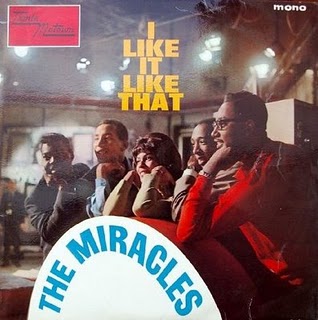
I Like It Like That is an album by Motown group the Miracles, compiled for the UK market and released on the UK Tamla-Motown label (TML11003) as one of its initial group of six albums in March 1965. Known as the Miracles' "forgotten album", few people, outside of Motown insiders, hard-core Miracles fans, and collectors, remember that it had even existed. This album featured a combination of several new-for-1964 songs along with previously issued material from the group's album from the year before, The Miracles Doin' Mickey's Monkey. New for 1964 songs included "I Like It Like That", the Bobby Rogers-led flip side "You're So Fine and Sweet,"(this is the only original Miracles studio album that has that song), "That's What Love Is Made Of", another 1964 hit that the group performed on the American International Pictures release, the T.A.M.I. Show that year, and "Would I Love You", a song that became a popular regional hit tune for the group in Pennsylvania and The Midwest. The album also featured a Claudette Robinson-led cover version of the Orlons' #2 Pop smash, "The Wah-Watusi"., and the group's 1963 Top 40 Hit, "I Gotta Dance to Keep From Crying". Several of the group's other 1964 songs, including the chart hits "(You Can't Let the Boy Overpower) The Man in You", "Come On Do the Jerk", and its "B" side, "Baby Don't You Go", were not included. The new 1964 recordings "I Like It Like That", "Would I love You" and "That's What Love Is Made Of" were included on the only US Miracles 1964 album release "Miracles Greatest Hits From The Beginning" which was the first double album released by Motown Records.
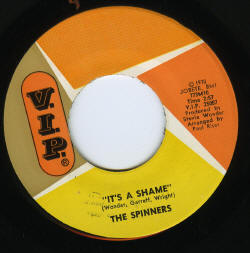
"It's a Shame" is a song co-written by Stevie Wonder, Syreeta Wright and Lee Garrett and produced by Wonder as a single for the Spinners on Motown's V.I.P. Records label. The single became the Detroit-reared group's biggest single on the Motown Records company since they had signed with the company in 1964 and also their biggest hit in a decade.
"I'll Always Love You" is a song co-written by William "Mickey" Stevenson and Ivy Jo Hunter and produced by Stevenson and Hunter as a single for The Spinners on the Motown Records label. The single became the Detroit-reared group's first charting single on the Motown Records company since they had signed with the company in 1964. The song was a top 40 pop single on the Billboard Hot 100 in the United States, on which it peaked at number 35. On the Billboard R&B singles chart, "I'll Always Love You" peaked at number 8. The song featured lead vocals by the group's main lead singer, Bobby Smith.
"That's What Girls Are Made For" is the debuting single for the American R&B/Soul vocal group The Spinners, released on Harvey Fuqua's Tri-Phi Records label in 1961.
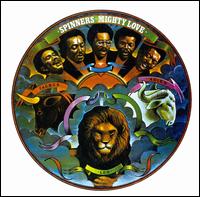
Mighty Love is the fourth studio album recorded by American R&B group The Spinners, released in March 1974 on the Atlantic label. It was the Spinners' second album for Atlantic and, like their breakthrough Atlantic debut Spinners, was produced by Thom Bell at Sigma Sound Studios in Philadelphia.

The Original Spinners is the 1967 debut album by The Spinners for Motown Records. The LP includes the group's earliest singles on the label, as well as their first ever single "That's What Girls Are Made For". None of the group's other material from Tri-Phi appear on this album.
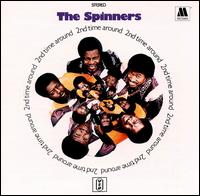
2nd Time Around is a studio album recorded by American R&B group The Spinners, released in October 1970 on Motown's V.I.P. label. This is their only album with G. C. Cameron. This is also the group's last album made while they were under contract with Motown Records; by the time of their next album, they had signed at Atlantic Records.
"Sadie" is a song recorded by the American R&B vocal group The Spinners. The song was written and produced by Joseph B. Jefferson, Bruce Hawes and Charles Simmons. Recorded at Philly's Sigma Sound Studios and released as the third single from their 1974 New and Improved album on Atlantic Records, "Sadie" would chart at number #7 on the U.S. R&B Singles Chart, their 10th consecutive Top 10 Atlantic single on the chart. It also reached the number #54 position on Billboard Pop Singles chart.
"Truly Yours" is a 1966 song and single by The Spinners for the Motown label. Co-written and produced by William "Mickey" Stevenson and Ivy Jo Hunter, the single became the Detroit-reared group's second to chart on the company label, and the fourth to chart altogether. It was also the last to chart in the 1960s and last to chart for the group until "It's a Shame". The single peaked at 11 on the BillboardBubbling Under Hot 100 charts. However, on the Billboard R&B singles chart, "Truly Yours" was a Top 20 hit, peaking at number 16.

"Ghetto Child" is a 1973 song recorded by American R&B music group the Spinners for the Atlantic label. It was written by Thom Bell and Linda Creed. It was produced by Bell, and recorded at Philly's Sigma Sound Studios with the house band MFSB providing the backing instrumentation. It is notable for being one of few songs that all three main leads, Bobby Smith, Philippé Wynne and Henry Fambrough sing lead. The song were focused on racial injustice and as a result on the 1967 Detroit Riot caused on Black-Ghetto people living due to segregation.
References
- ↑ The Complete Motown Singles Vol 10: 1970 [CD liner notes]. New York: Hip-O Select/Motown/Universal Records.
- ↑ "US Charts > The Spinners". Allmusic . Retrieved 2012-11-18.